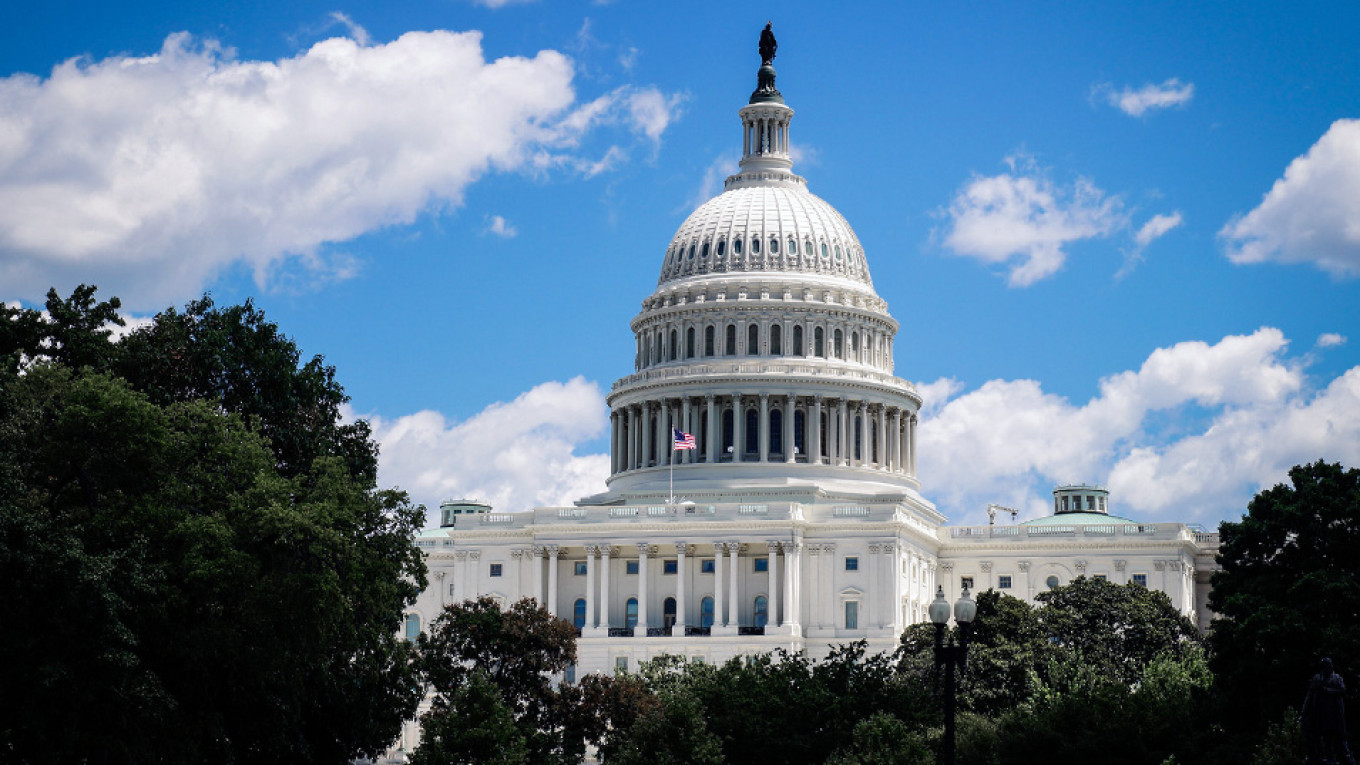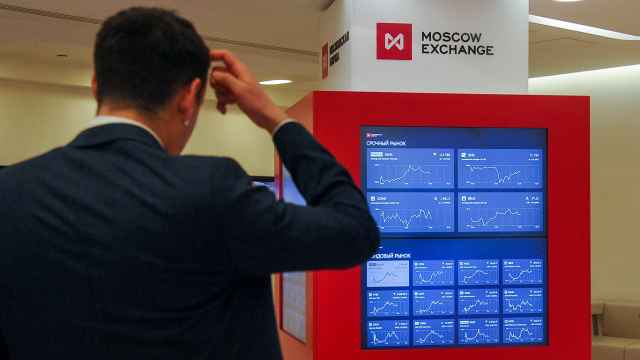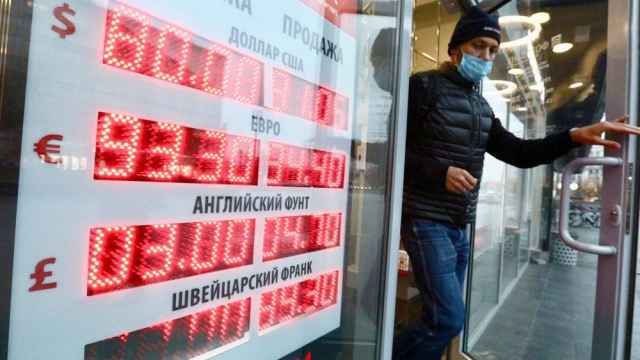Russian financial markets have shrugged off the latest round of sanctions announced by the U.S. on Thursday, with the Russian ruble and stock markets bouncing back strongly in Friday trading.
The ruble — which saw trading volumes five times higher than usual ahead of the sanctions announcement — recovered two days of losses to stand at 75.8 against the dollar during trading in Moscow.
The RTS stock market also added more than 1% on Friday morning to cap what has turned into a strong week for the dollar-denominated index, climbing more than 5% in total over the last five sessions.
The U.S. hit Russia with its toughest and broadest sanctions package in three years Thursday, banning U.S. financial institutions from buying Russian government debt in bond auctions from June 14, expelling 10 diplomats and sanctioning 40 companies and individuals.
But the measures were softer than first feared. U.S. banks and investors will still be able to hold on to any Russian state bonds they already own, and have not been prohibited from trading in the secondary market — meaning they can still buy, sell and hold Russian government debt, just not take place directly in bond auctions organized by Russia’s Finance Ministry, Central Bank or National Wealth Fund.
“For now, the U.S. seems to have pulled some of its punches: the sanctions are not as severe as they might have been,” Scope Ratings analyst Levon Kameryan told The Moscow Times.
The new sanctions are “unpleasant, but far from catastrophic,” said Andrey Kochetkov, lead broker at the state-owned Otkritie Bank.
“Although the new set of U.S. sanctions on Russia was the tightest in three years, they still turned out to be moderate, and the Russian market felt some relief after the announcement as adverse scenarios had been mostly priced in during recent weeks,” said Sofya Donets, Russia economist at Renaissance Capital.
Russian markets had started to recover Thursday evening as details of the sanctions package emerged. Earlier in the day, the ruble had fallen as much as 2% against the U.S. dollar — a significant move in foreign currency markets — and bond yields had jumped when reports first suggested the U.S. would sanction Russian government debt.
“Any additional outflows from the market and any foreign currency volatility in the short term could be limited,” Artem Zaigrin, Chief Economist of Sova Capital said in a research note to clients. As the fallout settles, he said greater clarity over the U.S. approach could “ease the risk premium” currently priced into Russian government bonds.
The yield on Russian government bonds had increased dramatically ahead of the sanctions announcement — a sign that investors viewed them as higher risk and were demanding larger returns to invest — but pared almost all their losses by the end of the day.
VTB Capital’s Maxim Korovin said the ruble should get a further boost in the coming weeks from the start of tax season in Russia — when large corporates will need to buy rubles, thus pushing up demand, in order to settle their tax bills.
However, others have cautioned that the ruble has not been linked to underlying economic fundamentals for many months now, with the currency more than 20% weaker than before the coronavirus pandemic, despite Russia’s impressive economic performance, low debt levels and a full recovery in the price of oil.
Analysts also cautioned that the sanctions announced Thursday were a “first move” by U.S. President Joe Biden, and that investors should be prepared for further escalations and tougher restrictions.
The U.S. has set up a “legal framework for dialing sanctions up — or down — quickly should a U.S. president wish,” Sberbank’s Cole Akeson told clients in a morning note Friday.
“Hence, the Biden administration appears to be attempting to show the Russian government, Congress and the public that it would welcome better relations with Russia, but that it is also preparing for further deterioration,” the note said.
BlueBay Asset Management economist Timothy Ash also said western investors would be weighing their options, and the economic implications of this package of sanctions could still cause market ripples.
“Without a doubt this action will stop some more investors, at the margin, from investing in Russia,” he said. Even though international investors are not prohibited from holding and trading Russian government debt on the secondary, Ash says investment houses will be “working overtime” not only to assess their legal risks, but “what is prudent from an ESG and reputational damage perspective,” in their investment strategies towards Russian assets.
“The U.S. has crossed a rubicon, and signalled that sanctioning sovereign debt is doable — even low-hanging fruit. Investors also have to look at the direction of travel in terms of Russia-U.S. relations. They are deteriorating and, given that, we surely have to expect more, not less, sanctions,” he added.
Tensions in eastern Ukraine remain a potential flashpoint, as does the ongoing treatment of Kremlin critic Alexei Navalny, whose health is deteriorating in prison. The Biden administration is due to outline new measures at the beginning of June in response to what it has called Russia’s illegal use of a chemical weapon in the poisoning of Navalny with a nerve agent.
“These new sanctions in a context of increasing geopolitical tension in the Donbass region of neighbouring Ukraine suggest a more determined approach toward Russia under the Biden administration — the risk of further sanctions remains high,” said Kameryan.
A Message from The Moscow Times:
Dear readers,
We are facing unprecedented challenges. Russia's Prosecutor General's Office has designated The Moscow Times as an "undesirable" organization, criminalizing our work and putting our staff at risk of prosecution. This follows our earlier unjust labeling as a "foreign agent."
These actions are direct attempts to silence independent journalism in Russia. The authorities claim our work "discredits the decisions of the Russian leadership." We see things differently: we strive to provide accurate, unbiased reporting on Russia.
We, the journalists of The Moscow Times, refuse to be silenced. But to continue our work, we need your help.
Your support, no matter how small, makes a world of difference. If you can, please support us monthly starting from just $2. It's quick to set up, and every contribution makes a significant impact.
By supporting The Moscow Times, you're defending open, independent journalism in the face of repression. Thank you for standing with us.
Remind me later.







